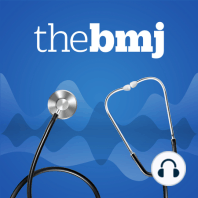26 min listen
Talk evidence covid-19 update - talking risk, remdesivir, and relevant research
FromThe BMJ Podcast
ratings:
Length:
41 minutes
Released:
Oct 30, 2020
Format:
Podcast episode
Description
In this talk evidence covid-19 update, we’re taking on risk - how do you figure out your individual risk of dying from the disease? Try QCovid, but remember that it’s figuring out your risk back in April.
When it comes to talking about risk, very few people actually engage with the number, so Alex Freeman from the Winton Centre for Risk and Evidence Communication at the University of Cambridge joins us to describe their research into more effective ways of presenting it.
Huseyin Naci, from the London School of Economics, returns to the podcast to talk to us about the problems of pulling all the trial data together, and where covid-19 has made people work together most effectively in tackling that issue.
Reading list;
Living risk prediction algorithm (QCOVID) for risk of hospital admission and mortality from coronavirus 19 in adults
https://www.bmj.com/content/371/bmj.m3731
Repurposed antiviral drugs for COVID-19 –interim WHO SOLIDARITY trial results
https://www.medrxiv.org/content/10.1101/2020.10.15.20209817v1
Producing and using timely comparative evidence on drugs: lessons from clinical trials for covid-19
https://www.bmj.com/content/371/bmj.m3869.full
When it comes to talking about risk, very few people actually engage with the number, so Alex Freeman from the Winton Centre for Risk and Evidence Communication at the University of Cambridge joins us to describe their research into more effective ways of presenting it.
Huseyin Naci, from the London School of Economics, returns to the podcast to talk to us about the problems of pulling all the trial data together, and where covid-19 has made people work together most effectively in tackling that issue.
Reading list;
Living risk prediction algorithm (QCOVID) for risk of hospital admission and mortality from coronavirus 19 in adults
https://www.bmj.com/content/371/bmj.m3731
Repurposed antiviral drugs for COVID-19 –interim WHO SOLIDARITY trial results
https://www.medrxiv.org/content/10.1101/2020.10.15.20209817v1
Producing and using timely comparative evidence on drugs: lessons from clinical trials for covid-19
https://www.bmj.com/content/371/bmj.m3869.full
Released:
Oct 30, 2020
Format:
Podcast episode
Titles in the series (100)
Tackling violence against women: This week, the World Health Organisation called for healthcare providers to be more aware of intimate partner and sexual violence against women, calling it a "global health problem of epidemic proportions." We look into what doctors need to know.And ... by The BMJ Podcast
